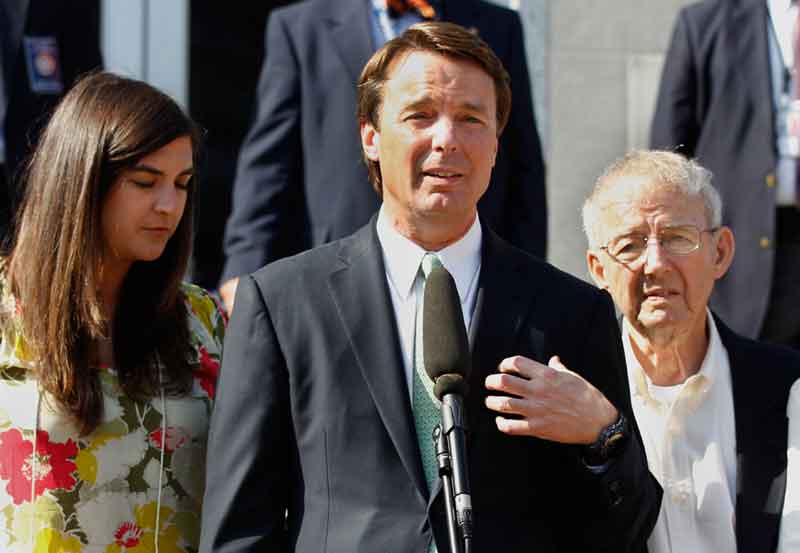If jurors had been asked to decide whether John Edwards was a cheating lowlife, it would have taken them 10 minutes. He fathered a child with a former campaign worker while his wife was terminally ill, then lied about it long and loud while campaigning for president of the United States. OK, five minutes.
What jurors were asked, though, was whether Edwards broke the law by using nearly $1 million in campaign contributions to cover up that affair. It took them nine days to find him not guilty on one of six counts. A judge declared a mistrial on the other five.
It’s a wholly unsatisfying verdict, especially for those who wanted to see the defendant drawn and quartered. But let’s not bother with Season 2. This reality show has been one big flop.
For one thing, it suffered from lack of character development. The 101-year-old heiress named “Bunny,” who routed secret payments to an Edwards aide to keep the mistress hidden, was too frail for even a cameo appearance. The billionaire Texas lawyer who paid for private jets, luxury hotels and a rented mansion in California was already dead. The Other Woman wasn’t called to testify. The defendant decided not to take the stand.
The only sympathetic characters were Edwards’ grown daughter and his parents — a constant but mostly silent courtroom presence.
A promising storyline involving the campaign aide and his wife, who funneled the money to Edwards’ mistress while keeping some for themselves, was never fully developed.
As for the plot — well, jurors couldn’t decipher it, and they tried a lot harder than the rest of us. They sat through 17 days of testimony and sifted through 500 exhibits in the jury room, including piles of phone and financial records.
They weren’t trying to figure out if Edwards had betrayed his family and his political supporters. Their job was to decide whether he knew about the secret payments and, if so, whether he knew they were illegal.
We can’t fault the jury for failing to agree on something the government can’t seem to figure out. The Federal Election Commission, which audited the campaign accounts, didn’t consider the payments campaign contributions. The Justice Department did.
The law defines campaign contributions as payments meant to influence the outcome of an election. Prosecutors argued that Edwards’ supporters knew his affair would hurt his candidacy and were willing to cough up big bucks to help him hide it from voters. That’s a crime.
Edwards’ attorneys argued that the payments were gifts, which he used to hide the affair from his wife. Perfectly legal.
Jurors managed to sort things out on one count.
Prosecutors might have done a better job convincing them if they’d rehearsed their argument in previous cases. But this was the first time they’d charged such behavior as a crime. It was clearly a reach. That didn’t stop a lot of people from hoping it would succeed anyway, but it’s time to drop the case.
Editorial by the Chicago Tribune distributed by MCT Information Services
Send questions/comments to the editors.



Success. Please wait for the page to reload. If the page does not reload within 5 seconds, please refresh the page.
Enter your email and password to access comments.
Hi, to comment on stories you must . This profile is in addition to your subscription and website login.
Already have a commenting profile? .
Invalid username/password.
Please check your email to confirm and complete your registration.
Only subscribers are eligible to post comments. Please subscribe or login first for digital access. Here’s why.
Use the form below to reset your password. When you've submitted your account email, we will send an email with a reset code.